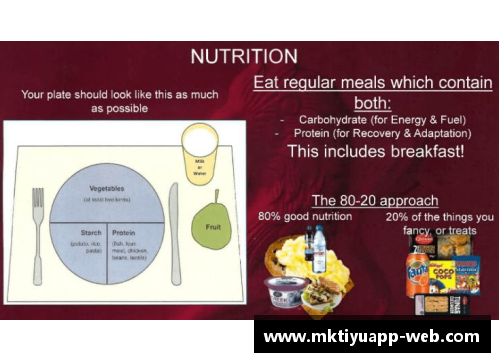职业球员的营养与饮食:优化训练表现的关键因素
Certainly! Here's the structured article on "Optimizing Training Performance through Nutrition and Diet for Professional Athletes":
**Abstract:**
Professional athletes rely heavily on nutrition and diet to enhance their training performance. This article explores key factors that optimize their performance through dietary strategies. It examines the role of macronutrients, micronutrients, hydration, and timing of meals in maximizing athletic potential. By understanding and implementing these factors, athletes can achieve peak performance and maintain optimal health.
---
**1、Macronutrients:**
Macronutrients play a fundamental role in the diet of professional athletes, influencing energy levels, muscle recovery, and overall performance.
Athletes typically require a balanced intake of carbohydrates, proteins, and fats to meet their energy demands and support muscle repair.
Carbohydrates serve as a primary fuel source, especially during high-intensity activities, emphasizing the importance of adequate intake and timing to sustain performance.
1、Proteins:
Proteins are essential for muscle repair and growth, with athletes needing slightly higher amounts to recover effectively from training sessions.
Timing protein consumption around workouts is crucial for maximizing muscle synthesis and adaptation to exercise-induced stress.
A variety of protein sources, including lean meats, dairy, and plant-based options, offer athletes flexibility in meeting their nutritional needs.
2、Fats:
Healthy fats contribute to sustained energy levels and support overall health in athletes, emphasizing sources like nuts, seeds, and fatty fish.
A balanced intake of omega-3 and omega-6 fatty acids aids in reducing inflammation and optimizing recovery post-training.
Adjusting fat intake based on training intensity and individual metabolic needs helps athletes maintain optimal body composition and performance.
3、Carbohydrates:
Carbohydrates are critical for replenishing glycogen stores and providing quick energy during intense exercise sessions.
Choosing complex carbohydrates such as whole grains and vegetables ensures sustained energy release and supports prolonged athletic performance.
mk体育官方appStrategic carb-loading before competitions or high-demand periods helps athletes maximize glycogen storage and enhance endurance.
---
**2、Micronutrients:**
Beyond macronutrients, micronutrients are essential for maintaining overall health, supporting immune function, and optimizing athletic performance.
Athletes require adequate intake of vitamins and minerals to support physiological processes, including bone health, oxygen transport, and muscle contraction.
Key micronutrients such as iron, calcium, vitamin D, and antioxidants play crucial roles in reducing the risk of injury and illness among athletes.
1、Iron and Calcium:
Iron is vital for oxygen transport and energy production, particularly significant for endurance athletes to prevent fatigue and optimize performance.
Calcium supports bone health and muscle function, essential for maintaining skeletal integrity and reducing the risk of stress fractures.
Ensuring sufficient intake of these minerals through diet and, if necessary, supplementation helps athletes meet their unique nutritional demands.
2、Vitamins and Antioxidants:
Vitamins such as vitamin D, C, and E contribute to immune function and recovery, aiding in the repair of muscle tissue and reducing oxidative stress.
Antioxidants from fruits, vegetables, and nuts help mitigate exercise-induced inflammation and support cellular repair processes post-exercise.
Strategies to incorporate a diverse range of micronutrient-rich foods into an athlete’s diet promote overall health and optimize training adaptations.
3、Hydration:
Hydration is critical for maintaining performance and preventing dehydration-related complications during training and competition.
Athletes should monitor fluid intake to replace losses through sweat, adjusting consumption based on environmental conditions and individual sweat rates.
Optimal hydration supports thermoregulation, nutrient transport, and cognitive function, enhancing overall athletic performance and recovery.
---
**3、Timing of Meals:**
The timing of meals and nutrient intake around training sessions is crucial for optimizing energy availability, promoting recovery, and supporting adaptation to exercise stress.
Strategic meal timing helps athletes maximize glycogen storage, enhance muscle protein synthesis, and minimize muscle breakdown.
Pre-exercise nutrition focuses on providing adequate carbohydrates for fuel and minimizing gastrointestinal distress during workouts.
1、Pre-Exercise Nutrition:
Consuming a balanced meal or snack containing carbohydrates and a moderate amount of protein 2-4 hours before exercise provides sustained energy and supports muscle function.
Hydration before exercise ensures adequate fluid balance and enhances thermoregulation during physical exertion, optimizing performance and reducing the risk of dehydration.

2、Post-Exercise Recovery:
Immediately following exercise, consuming a combination of carbohydrates and proteins within the first 30 minutes to 2 hours supports glycogen replenishment and muscle repair.
Timing protein intake post-exercise stimulates muscle protein synthesis, facilitating recovery and adaptation to training-induced stress.
Incorporating micronutrients and fluids into post-exercise meals aids in rehydration, replenishment of electrolytes, and overall recovery.
3、Nutrient Timing Strategies:
Strategically timing meals and snacks throughout the day maintains stable blood sugar levels and sustains energy for consistent training performance.
Adjusting nutrient intake based on training volume and intensity helps athletes meet their energy demands and achieve optimal nutrient timing for enhanced performance.
Individualized nutrition plans tailored to training schedules and performance goals optimize nutrient timing strategies, supporting long-term athletic success.
---
**4、Conclusion:**
Optimizing training performance through nutrition and diet involves a comprehensive approach focusing on macronutrients, micronutrients, hydration, and meal timing.
By understanding the role of each component and implementing evidence-based strategies, athletes can enhance performance, support recovery, and maintain overall health.
Continued research and personalized nutrition plans are essential to meet the unique needs of professional athletes and maximize their athletic potential.
Overall, integrating these key factors into a structured nutrition plan empowers athletes to achieve peak performance and excel in their respective sports.

曼联俱乐部在最近的一次新闻发布会上,正式宣布签约了一名备受瞩目的年轻球员,这位新星的到来无疑为球队注入了新鲜血液。尽管具体的转会费尚未对外公布,但根据多方消息透露,这笔交易金额不菲,充分体现了俱乐部对这名新星的重视。 这名年轻球员出生于足球世家,早在青训时期便展现出过人的天赋。在不到20岁的年纪,他...